If your real estate business isn’t showing up on the first page of search results, you’re losing deals. It’s the key to connecting with customers, both buyers and sellers, exactly when they’re looking. In 2026, real estate SEO is the foundation of real growth in a digital-first market.
Nowadays, most homebuyers start their search online, turning to search engines before speaking to an agent. It doesn’t matter if they’re browsing property listings, researching neighborhoods, or comparing real estate agents. In all cases, if you aren’t ranking, you’re invisible.
This guide to real estate SEO breaks down the major things you need to know for an efficient marketing strategy and how to do SEO for a real estate website.
- Most property searches now begin on smartphones or tablets, which makes mobile optimization essential.
- Lifestyle-based searches like “homes near parks” are gaining popularity.
- 96% of buyers start to look for a home on Google or another search engine.
- SEO can bring an ROI of 1,389% for real estate businesses.
- High visibility in localized search helps you obtain more qualified leads and ensures increased revenue.
The Role of SEO for Real Estate Businesses Today
Today, more than 90% of buyers start their home search on Google or other search engines. At the same time, only 9% of searchers scroll to the bottom of the first search engine results page (SERP), let alone the second or third pages.
If your website isn’t showing up on top, you’re losing visibility, traffic, and leads to your competitors. How can you increase the chance of clients discovering your services? An effective real estate SEO strategy helps you rank higher in SERPs, increasing your chance of reaching a client at the right moment.
So, what is real estate SEO? This is search engine optimization tailored for the real estate industry. It involves developing your website, property listings, and other content to appear higher in search results. This means more traffic that can be converted into leads and generate more revenue.
Search Behavior Trends in Real Estate
All industries see significant changes in the way people search for services and products due to shifting lifestyles and new technologies. The effectiveness of SEO for real estate websites depends on how well your website adapts to these trends. Here’s what you should consider in 2026:
- Mobile-first searches: According to the most recent report of the National Association of Realtors, around 72% of users start their search on mobile devices. Thus, your real estate website must be fast, responsive, and designed for the small screen.
- Lifestyle-centric search: Buyers are focusing more on individual neighborhoods and specific features they want to see in a home. For example, they may search for “homes near top-rated schools” or “walkable communities in [city]”. To stay visible in local searches, your strategy must include targeting local and lifestyle-related real estate SEO keywords.
- Data-driven decision making: Real estate remains a significant investment that requires thorough research. Searchers actively engage with resources that offer tools and articles on market trends, price predictions, or investment potential to make informed purchasing decisions. Redfin’s price predictions are a great example.
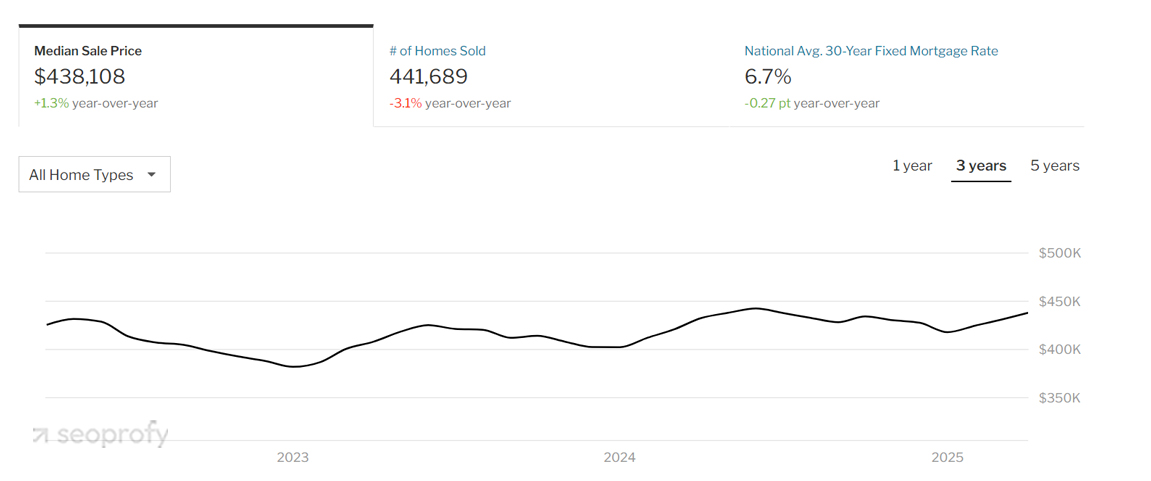
The ROI of SEO Compared to Other Marketing Channels
Let’s be clear, SEO for real estate is one of the most cost-effective ways to attract customers, especially when compared to paid advertising. Websites in this industry can see an ROI of 1,389% from SEO, meaning one dollar of investment can bring $13.89 in returns. In contrast, Google Ads for the real estate industry has the lowest conversion rates, totaling 2.47%, while the cost reaches $2.37 per click.
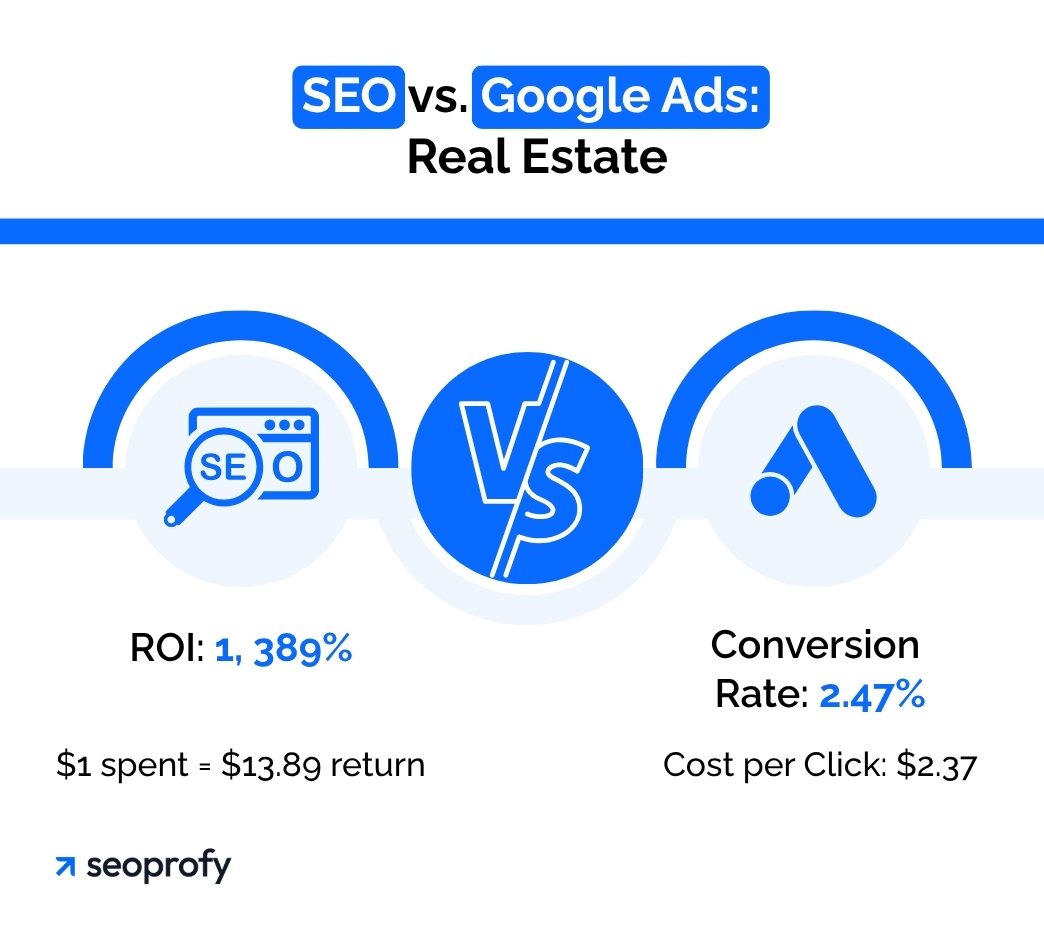
While paid ads disappear the moment you stop paying, SEO value builds over time and keeps bringing results after the initial investment. A solid real estate SEO content strategy can ensure top search engine rankings that attract qualified leads to your website regularly. It also helps you build brand awareness and trust as potential clients notice your business more often.
Still, SEO requires upfront investment. You can try handling some tasks yourself, but for an efficient long-term strategy, it’s better to work with professionals. Although your budget may be higher due to SEO pricing, you’ll likely achieve a stronger ROI. Reliable agencies will also help you understand the potential SEO ROI for your business.
How to Prepare Your Real Estate Website for SEO Success
At the start, you need to focus your real estate SEO efforts on technical preparations and on-page SEO to ensure that search engines can properly crawl, index, and rank your site. This way, you’ll also create a smoother user experience across all devices.
It doesn’t matter if you’re starting from scratch or optimizing an existing site. This process determines the long-term SEO performance.
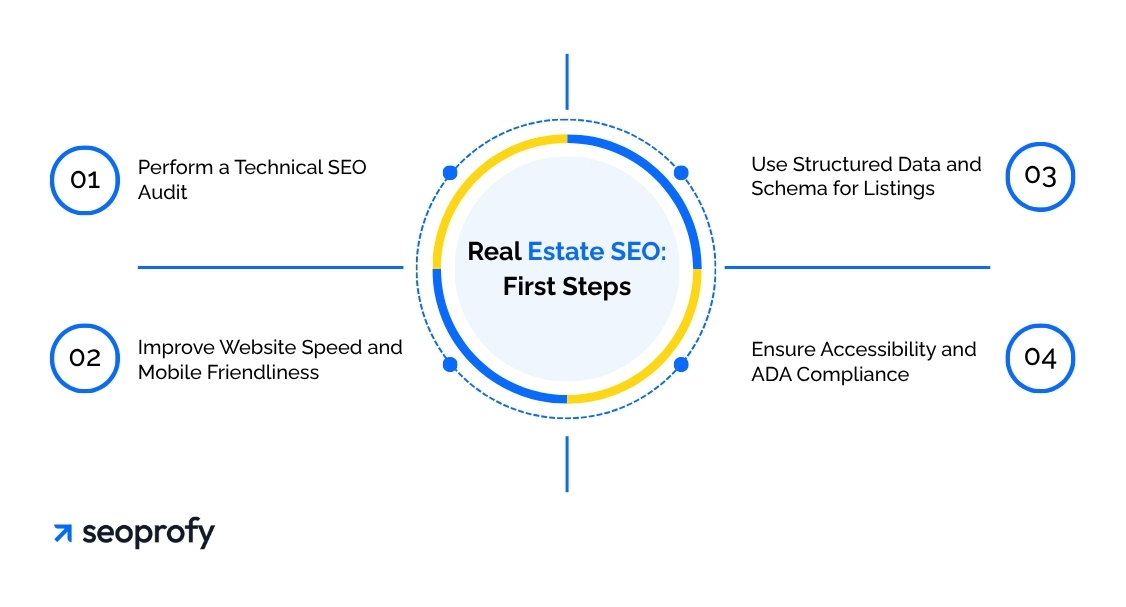
Perform a Technical SEO Audit
Your first step in building a solid SEO strategy is to conduct a comprehensive technical audit. This includes checking the overall health and efficiency of your website. The aim is to ensure that it’s crawlable, indexable, and free of performance issues that may hinder your website’s visibility. In particular, you should:
- Crawl your website: You can use tools like Screaming Frog to identify such issues as broken links, duplicate content, missing meta tags, and more.
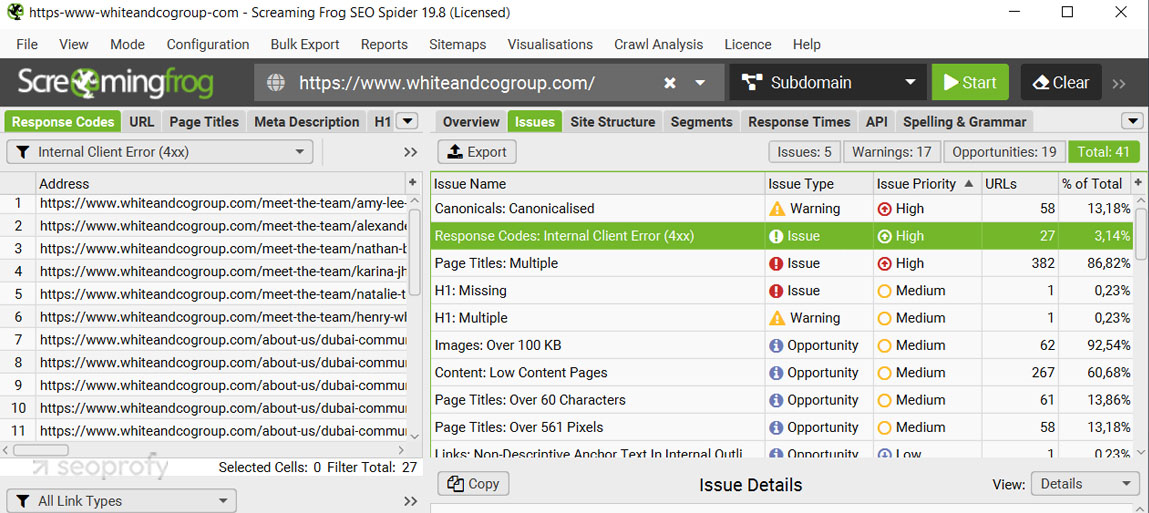
- Check indexability and crawlability: Ensure that search engines can access and index your site’s content. You can use Google Search Console to identify any indexing issues and monitor your site’s presence in search results.
- Analyze site architecture: A well-structured site facilitates better crawling and user experience. URLs should be clean, descriptive, and use hyphens to separate words.
- Ensure HTTPS security: Confirm that your site has a valid certificate and resolve any mixed content issues to avoid the use of non-secure content.
Improve Website Speed and Mobile Friendliness
Site speed and mobile usability are also important factors for attracting and retaining customers as 62.54% of the global website traffic comes from mobile devices. Thus, most users will likely visit your real estate site on a smartphone or tablet. In addition, Google now primarily uses the mobile version of your website for indexing and ranking.
Poor load times can also affect your ranking in search results as they push users toward faster, better-optimized real estate sites. For insights about your website’s speed, you can use tools like Google PageSpeed Insights or GTmetrix. Also, remember to optimize images and minimize CSS and JavaScript files to enhance speed.
Use Structured Data and Schema for Listings
Structured data, also known as schema markup, is a way to provide search engines with detailed information about your real estate listings. Adding this code to your website will make your listings more informative and attractive in search results.
For real estate, this means providing specific details about properties, such as price, location, and features, in a way that search engines can easily interpret. To implement structured data, you can use tools like Google’s Structured Data Markup Helper or plugins for platforms like WordPress to simplify the implementation process.
The main schema types for a real estate website are:
- Property listings: Present details like price, availability, and real estate agent information.
- Offer: Includes pricing details, such as listing price or rental fees.
- Place: Provides the property’s location.
- Organization: Details about the real estate agency, including name, contact information, and address.
Ensure Accessibility and ADA Compliance
An inaccessible website prevents people with disabilities from accessing information and services, like physical barriers can restrict access to buildings. Ensuring web accessibility is crucial for providing equal access to all users. At the same time, it’s one of the most underrated and overlooked real estate SEO tips.
The Department of Justice requires state and local governments, as well as businesses open to the public, to follow the Web Content Accessibility Guidelines (WCAG). Here are the main rules:
- Text on the site must be readable and scalable.
- Images should include alt tags.
- Navigation must be keyword-friendly.
- Videos are required to have captions.
- Forms should be properly labeled.
By adhering to this, you can create a website that is comfortable to use for everyone, which improves your ranking in organic search results as a result.
Real Estate Keyword Strategy and Content Creation
Any strong SEO strategy starts from identifying your target audience. In SEO for the real estate industry, this can be first-time homebuyers, investors, or renters. You should also define your SEO goals, like lead generation or boosting local visibility. With an understanding of your objectives and who your target clients are, you can start developing an SEO strategy and creating content.
Finding and Targeting High-Intent, Local Keywords
The keywords your potential clients enter in the search bar determine the most important elements of your SEO strategy. Use tools like Google’s Keyword Planner, Ahrefs, or Semrush to identify these terms and define how much traffic they can bring you.
For example, with Semrush’s Keyword Magic Tool, you can find the most relevant real estate keywords for your content, based on the level of interest in the last 12 months and search intent:
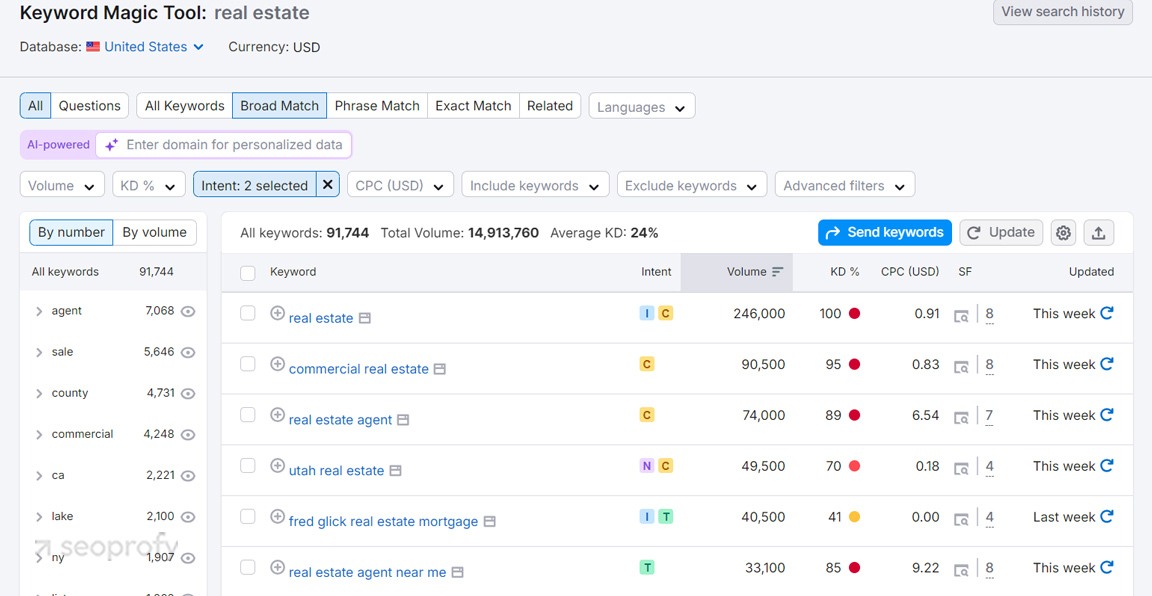
But you don’t need just any words. Focus on:
- Local market phrases like “apartments near [neighborhood]”
- Transactional terms like “buy”, “sell”, or “real estate agent near me”
- Niche topics like “investment properties with rental income potential”.
High search volume keywords like “houses for sale” can seem very tempting, but they are very difficult to rank for due to high competition. Long-tail keywords like “new construction homes in [state]” or “homes with pools for sale” can be more realistic, although they mostly have a lower search volume. The ideal options should combine decent search volume and low keyword difficulty.
When it comes to optimizing your content with these terms, avoid keyword stuffing and aim for naturally placing them across property pages, blog posts, and guides.
Content Types That Drive Leads: Blogs, Guides, Tools
The next step is to create useful, informative, and consistent content optimized with those keywords. This can turn your website into an authoritative resource. With quality content, you’ll ensure higher organic traffic and improve search rankings. Top-performing content types include:
- Local guides: They are powerful for capturing high-intent users. Break content into clear sections with optimized headings, include internal links, and cover long-tail keywords.
- Educational blog posts: If you’ve decided to start with a blog, focus on topics that answer questions or solve problems for the target audience.
- Interactive tools: Mortgage calculators or property comparison tools can increase engagement and reduce bounce rate, keeping users on the site.
- FAQ sections: They answer specific questions and client concerns.
- Landing pages for property types: If you target niche buyer groups, build separate pages for each segment, like real estate investors, first-time buyers, or retirees.
Tools like Semrush’s Topic Research can help you find ideas with real search volume (which means real interest):
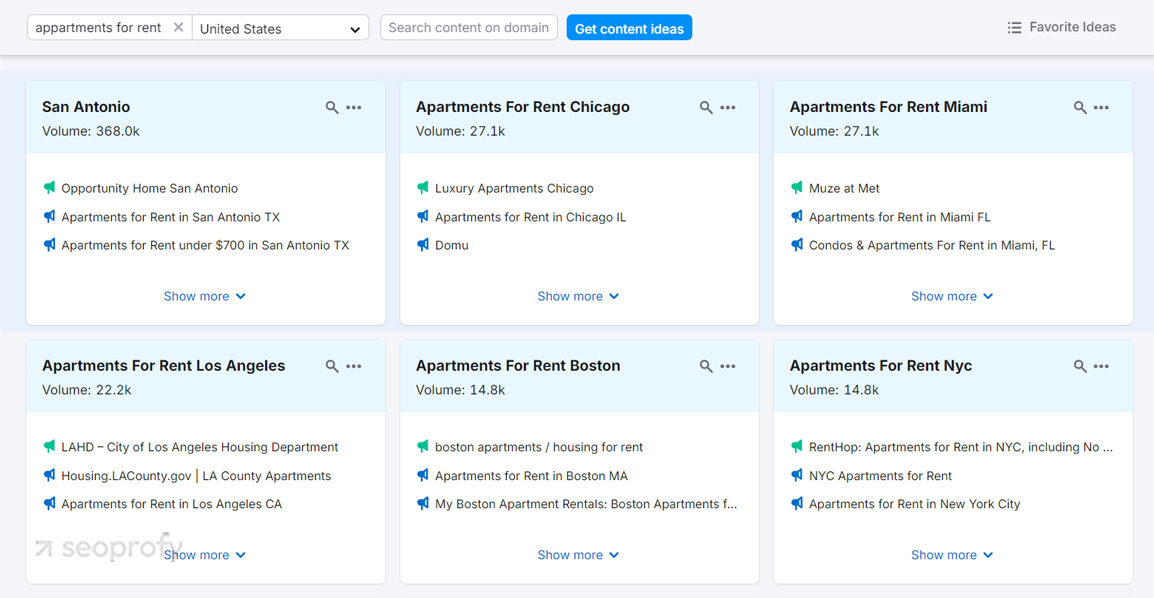
Optimizing Titles, Meta Descriptions, and Headings
Strong on-page SEO starts with metadata that reflects the intent of the page and its target keywords. The main elements are a meta description and a title tag. This summarizes a webpage’s content and clarifies to search engines what to display on their results pages.

The best practices are as follows:
- Include real estate keywords in page titles, ideally at the beginning.
- Keep meta descriptions under 160 characters with a clear call to click.
- Use H1 for main page headers, and H2s/H3s to organize content around relevant keywords and make it scannable.
- Whenever relevant, include modifiers like “best”, “top”, or “2026” to capture attention.
Video Content and SEO Integration
Video content is an important part of real estate marketing strategies — it can help you generate up to 66% more leads. From virtual tours to educational explainers, video helps increase engagement, time spent on site, and trust. Thus, adding a video to a website can be a great way to stand out in crowded digital real estate marketplaces.
To make the most out of video content, use keyword-rich titles and descriptions, add transcripts and captions, embed videos on landing pages, and ensure videos are optimized for fast loading.
Leverage Real Estate Local SEO for Maximum Visibility
So much in property research is about location, right? That’s why local SEO for real estate is a must. Whether your potential clients look for the best real estate agent in their area or browse property listings in a specific city, being visible in local search results helps you capture more qualified leads and convert traffic into revenue.
Google Business Profile Optimization and Management
Your Google Business Profile (GBP) is one of the most critical tools for local visibility. An optimized GBP improves your chances of showing up in Google Maps, the local pack, and other local search results. In addition, customers are 2.7 times more likely to trust a business with a complete and frequently updated GBP.
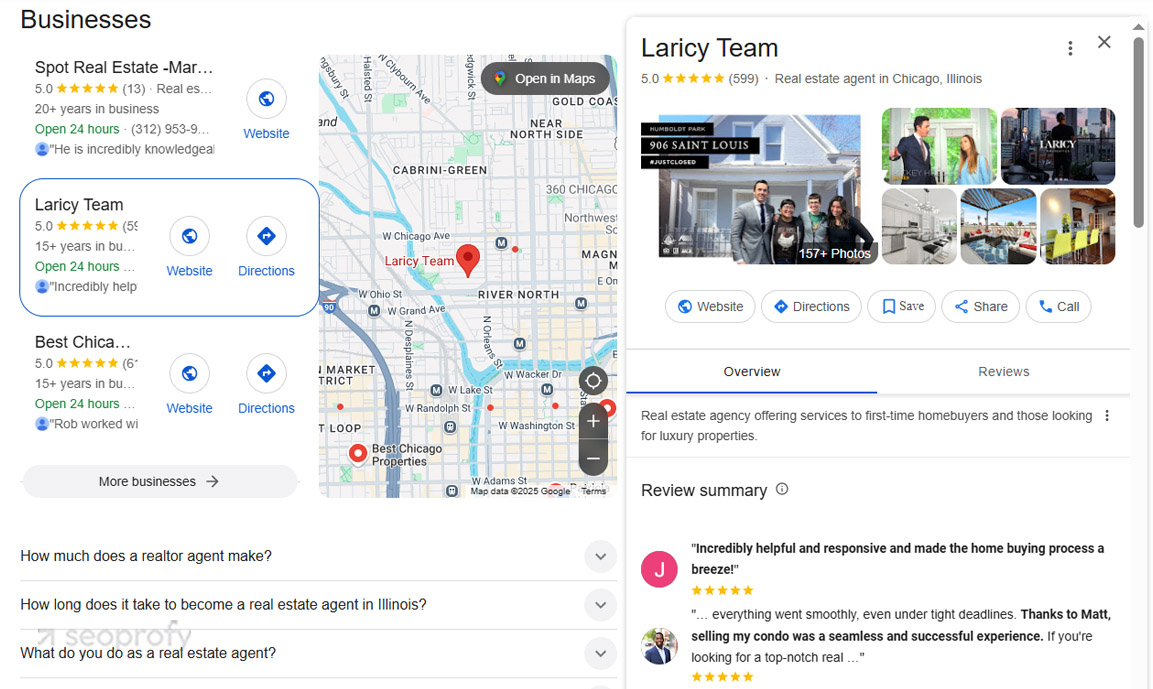
To optimize your Google Business listing, you should take these steps:
- Use your full business name: Make sure it’s the same as on your website, social media, and other platforms.
- Select relevant business categories: Choose categories that accurately reflect your services to match the right local searches.
- Include target keywords: Use relevant keywords in your business description and services.
- Add high-quality images: Upload professional photos of your office, team, and workspace.
- Be active and engaged: Verify your listings, respond to reviews, and post updates when needed.
- Update working hours and contact information: Accurate information ensures potential clients can reach you easily.
Getting and Responding to Reviews
Positive reviews on your GBP and other platforms ensure customers’ trust and show search engines that you are worth recommending. This can also prove your strong local relevance.
Here are some tips for you to manage reviews:
- Ask satisfied clients to leave a review.
- Respond to all reviews, both positive and negative, professionally and quickly. Consider offering solutions as a response to negative feedback to improve a client’s opinion.
- Use target keywords in your replies where appropriate.
Local Citations and NAP Consistency
Local citations are mentions of your business across online directories, review platforms, and business listings. They can increase your brand’s visibility among a local audience and contribute to your site’s backlink profile, which is another key ranking factor in real estate local SEO.
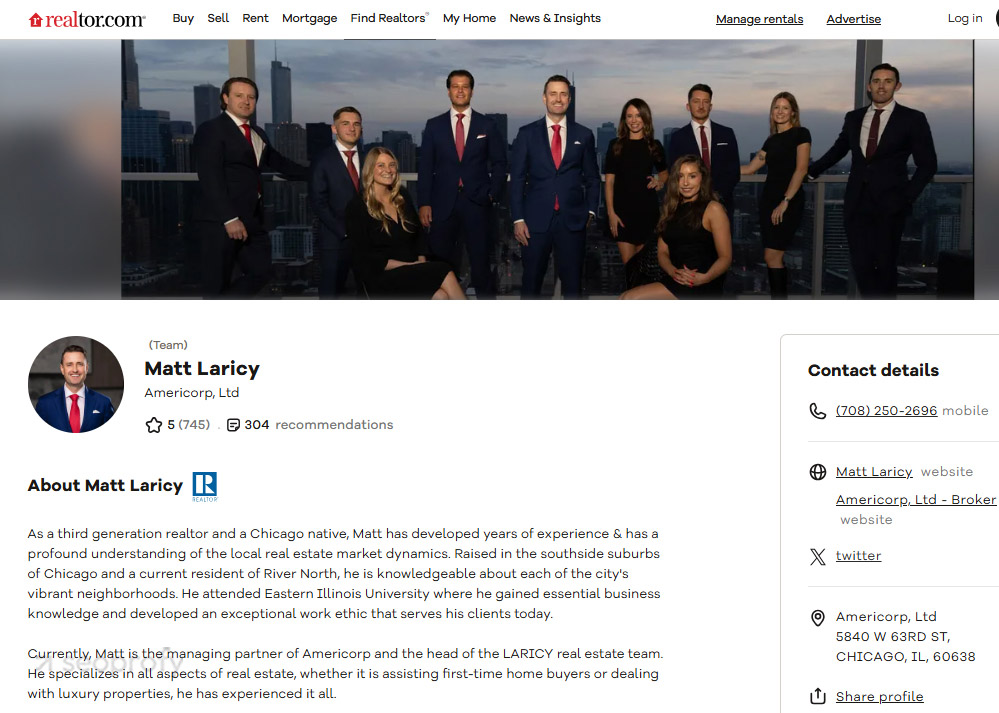
Still, you must also remember about NAP (Name, Address, and Phone Number) to get the full SEO benefit. This data must appear exactly the same across all platforms: your GBP, website, and third-party listings. Inconsistencies can confuse both search engines and potential clients, weaken your local authority, and ultimately hurt your visibility.
Backlink Building
When another reputable site links to you, you get a backlink. In search engine optimization, backlinks are valued because they reinforce your E-E-A-T (Expertise, Experience, Authoritativeness, Trustworthiness) profile and increase your traffic and brand recognition. They show that other companies trust you and refer to your content.
To build local backlinks, you can:
- Partner with local publications or bloggers
- Sponsor community events or nonprofits
- Get listed on the local chamber of commerce and real estate association sites.
Leveraging Social Media Platforms for SEO Benefits
While social media may not impact search rankings, it has a huge significance in building visibility, connecting with your audience, and even getting backlinks. The best practices for real estate companies include:
- Sharing your blog posts, listings, and videos across your media platforms
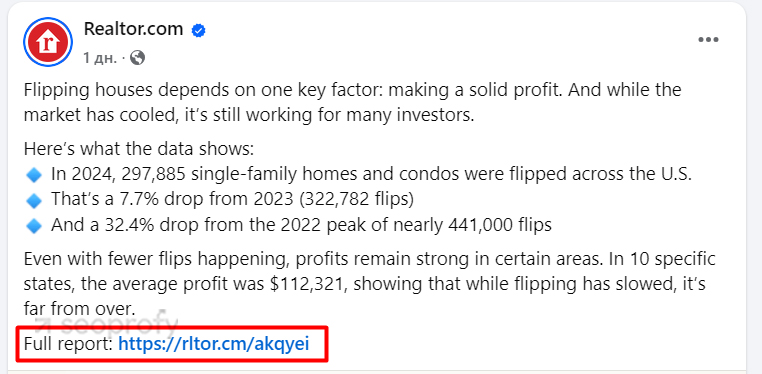
- Using local hashtags and geo-tags to attract nearby users
- Encouraging sharing among your workers and clients to expand your reach.
With a strong real estate SEO strategy, you can reach people who are ready to buy and win their trust. SeoProfy is ready to help you get real results.
- Achieve local SEO dominance
- Increase conversion rates
- Get more revenue

Measuring, Refining, and Scaling Your SEO Efforts
The SEO timeline can be long, and you may not see results immediately. However, it’s important to monitor progress regularly to adjust your strategy and uncover new opportunities.
To get the most out of SEO for real estate sites, you need to track the performance of your website, identify areas for improvement, and adjust based on this data. Refining the approach in time is how to go from basic visibility to lead generation and revenue growth.
Key Metrics to Watch for Real Estate SEO
Accurate measuring of SEO performance reveals which strategies are the most effective. Here are the core metrics to monitor:
- Organic traffic: Measures how many users reach your real estate website without paid ads.
- Search rankings: Track how your SEO keywords perform over time.
- Qualified leads: Monitor inquiries, form fills, and calls that convert into clients.
- Click-through rate (CTR): Shows how well your meta descriptions and titles attract attention.
- Bounce rate and time on site: Help assess how relevant and engaging your pages and blog content are.
- Google Business Profile insights: Track views, clicks, and actions taken on your listing.
Tools for Monitoring and Reporting SEO Performance
For reliable evaluation and further forecasting, you need to use the right tools and analytics platforms to measure your progress. Some of the best SEO tools for analytics include:
- Google Analytics: Track user behavior, conversions, and traffic sources.
- Google Search Console: Monitors indexing, keyword rankings, and technical issues.
- Semrush or Ahrefs: Great for keyword tracking, on-page SEO audits, and backlink monitoring.
Common SEO Mistakes and How to Avoid Them
Real estate SEO is a complicated process that involves analyzing hundreds of pages, monitoring competitors, writing and rewriting content, and more. It’s easy to make mistakes, but you can prevent them if you look out for the following:
- Keyword stuffing: Using too many SEO keywords can lower your search rankings, so focus on writing helpful, informative content that sounds natural and not over-optimized.
- Neglecting mobile optimization: Slow loading and poor responsiveness are the main reasons why mobile device users leave websites.
- Ignoring technical SEO: Broken links, slow pages, and crawling errors lead to a frustrating user experience and hurt the visibility of your site.
- Duplicate content: If you repeat the same descriptions across property listings, Google can flag them as unoriginal and stop showing them in searches.
Continuous Improvement: Content Updates and New Opportunities
A winning SEO content strategy for real estate is never static. Our SEO case studies show that regularly analyzing your performance and reacting to changes in algorithms or competitor strategies in time is critical for consistent results.
So, here’s what you should do regularly:
- Update blog posts with new statistics, listings, or insights to keep them relevant
- Add new internal links to increase traffic across your site
- Check data from keyword research tools to check your rankings and discover new opportunities
- Refresh listing pages with updated photos, pricing, and descriptions.
Start Boosting Your Real Estate SEO Today
Effective real estate SEO strategies bring businesses more leads, greater revenue, and sustainable digital growth. If you’re aiming for long-term results in a competitive market, investing in professional real estate SEO services can help you reach more potential clients.
The right SEO partner and the right actions can turn your website into your most powerful marketing tool. SeoProfy is ready to apply its expertise in SEO for real estate to achieve your digital marketing goals!













